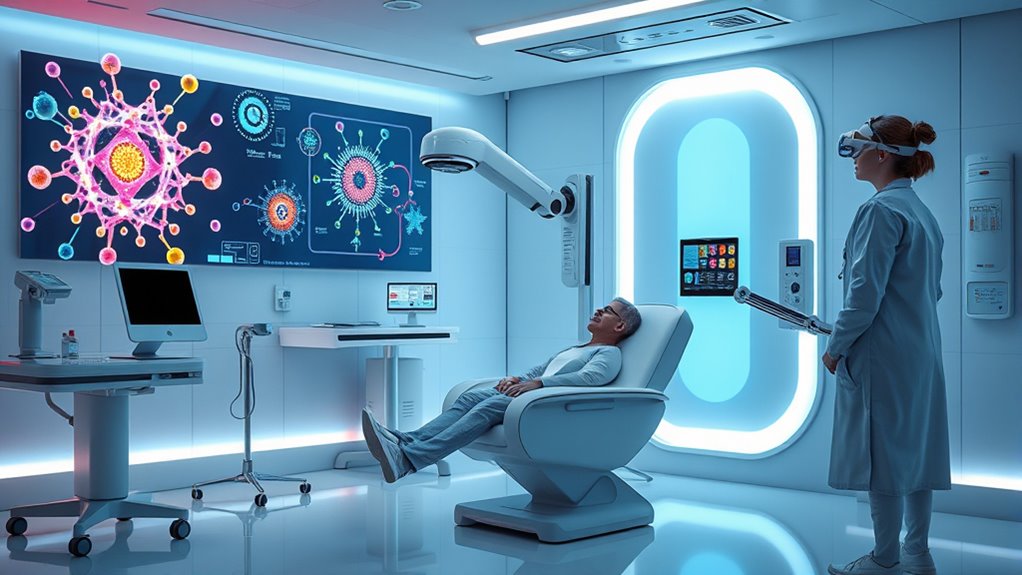By 2025, immunotherapy and AI are transforming cancer treatment by enabling early detection and highly personalized therapies. AI-powered liquid biopsies can spot tumor DNA early and monitor treatment responses in real-time, while personalized vaccines activate your immune system to target cancer specifically. Advanced imaging improves diagnosis and treatment planning. This integrated approach reduces side effects and increases survival chances. Staying informed will reveal how these innovations are making cancer care more precise and accessible than ever before.
Key Takeaways
- Personalized vaccines tailored to individual genetic profiles enhance immune response and reduce recurrence risk.
- AI-powered liquid biopsies enable early detection and real-time monitoring of tumor DNA for adaptive treatment.
- Combining immunotherapy with AI-driven diagnostics improves targeting of resistant cancer cells and treatment precision.
- Advanced imaging technologies integrated with AI optimize tumor localization and treatment planning.
- These innovations collectively shift cancer care toward early, proactive, and less invasive, biology-guided strategies by 2025.

By 2025, breakthroughs in cancer research and technology are transforming how we diagnose and treat the disease. You’ll find that personalized vaccines are becoming more common, tailored specifically to your unique genetic profile. Unlike traditional vaccines, which target broader populations, these vaccines are designed after analyzing your tumor’s genetic makeup. This means they can trigger your immune system to recognize and attack cancer cells more effectively, reducing the risk of recurrence and minimizing side effects. Alongside this, liquid biopsies are revolutionizing early detection and ongoing monitoring. Instead of invasive tissue biopsies, you simply provide a blood sample, and advanced technology detects tiny fragments of tumor DNA circulating in your bloodstream. This allows doctors to catch cancer at its earliest stages, often before symptoms appear, and track how your disease responds to treatment over time.
With personalized vaccines, you benefit from a therapy that’s uniquely suited to your cancer’s specific mutations. This approach not only boosts your immune response but also helps prevent the cancer from developing resistance. When combined with liquid biopsies, your healthcare team can continuously monitor the effectiveness of your treatment, making adjustments as needed without invasive procedures. For example, if tumor DNA levels rise, indicating potential relapse, your doctor can swiftly modify your therapy plan. This real-time feedback loop enhances your chances of successful treatment and reduces unnecessary exposure to ineffective therapies.
The synergy of these advancements means you’re less likely to undergo unnecessary surgeries or treatments and more likely to receive targeted, precise care. The data from liquid biopsies helps identify mutations that might suggest resistance to certain drugs, enabling your team to switch strategies early. Meanwhile, personalized vaccines are evolving from experimental to standard practice, offering hope for long-term remission. They work by training your immune system to recognize cancer-specific markers, creating a personalized immune defense that adapts as your disease changes. Additionally, improvements in imaging technology are aiding in better tumor localization and treatment planning.
In essence, these innovations put you at the center of a more proactive, tailored approach to fighting cancer. The combination of personalized vaccines and liquid biopsies exemplifies how technology is making cancer care more precise, less invasive, and more effective. As these tools become more accessible, you’ll see a future where early detection and personalized treatment significantly improve survival rates and quality of life. In 2025, cancer no longer has to be a one-size-fits-all battle; instead, it becomes a fight where your unique biology guides your path to recovery.
Frequently Asked Questions
How Will Immunotherapy Treatments Be Personalized for Individual Patients?
You’ll get personalized immunotherapy treatments through advanced biomarker discovery and genetic profiling. These tools analyze your unique genetic makeup and tumor markers, helping doctors identify which therapies will work best for you. AI accelerates this process, providing precise insights quickly. As a result, your treatment plan becomes tailored to your specific cancer profile, increasing effectiveness and reducing side effects, so you have a better chance of recovery.
What Are the Potential Risks of Ai-Driven Cancer Therapies?
You should be aware that AI-driven cancer therapies carry potential risks like AI bias, which could lead to inaccurate treatment recommendations, and data privacy concerns, risking sensitive health information. These issues might result in ineffective or unsafe treatments. To mitigate these risks, strict data security measures and continuous AI system monitoring are essential, ensuring personalized therapies are both safe and equitable for every patient.
How Accessible Will Advanced Treatments Be Globally by 2025?
By 2025, advanced treatments will be more accessible worldwide, but global healthcare disparities and treatment affordability remain hurdles. You might imagine clinics in wealthy nations offering cutting-edge immunotherapy, while low-income regions struggle to access basic care. Efforts to reduce costs and improve infrastructure aim to bridge this gap, making innovative therapies available to more people. Still, equitable access will depend on continued international cooperation and policy improvements.
What Ethical Considerations Arise From AI in Cancer Diagnosis?
When using AI for cancer diagnosis, you need to consider ethical issues like patient privacy and algorithm bias. Protecting sensitive health data is vital, so you should ensure strict security measures are in place. Additionally, you must be aware that biased algorithms could lead to misdiagnoses or unequal treatment, so continuously reviewing and updating AI systems is fundamental to maintain fairness and accuracy in patient care.
Will These Innovations Reduce Overall Cancer Mortality Rates Significantly?
Like a lighthouse guiding ships, these innovations will definitely lower cancer mortality rates. You’ll see earlier detection through AI analyzing genetic markers, enabling treatment customization tailored to each patient. This precision approach guarantees more effective therapies, reducing deaths. While it might not eliminate all cases, these advancements will unquestionably improve survival chances and quality of life, making a profound impact on cancer outcomes in the coming years.
Conclusion
By 2025, you’re like a skilled navigator, steering through the complex battle against cancer with the aid of immunotherapy and AI. Imagine these tools as a high-tech lighthouse guiding your team through stormy waters, revealing hidden dangers and illuminating the best path forward. With breakthroughs happening every day—like a recent study showing a 30% increase in survival rates—you have powerful allies on your side. Together, you’re transforming hope into reality, fighting cancer smarter and stronger than ever before.









